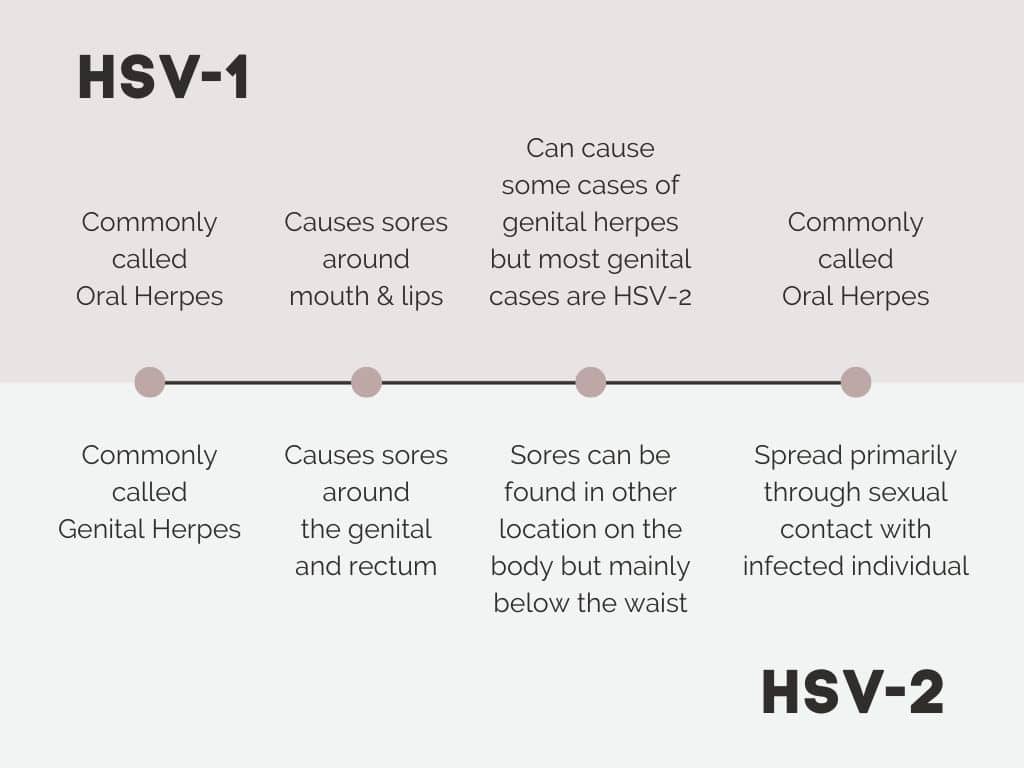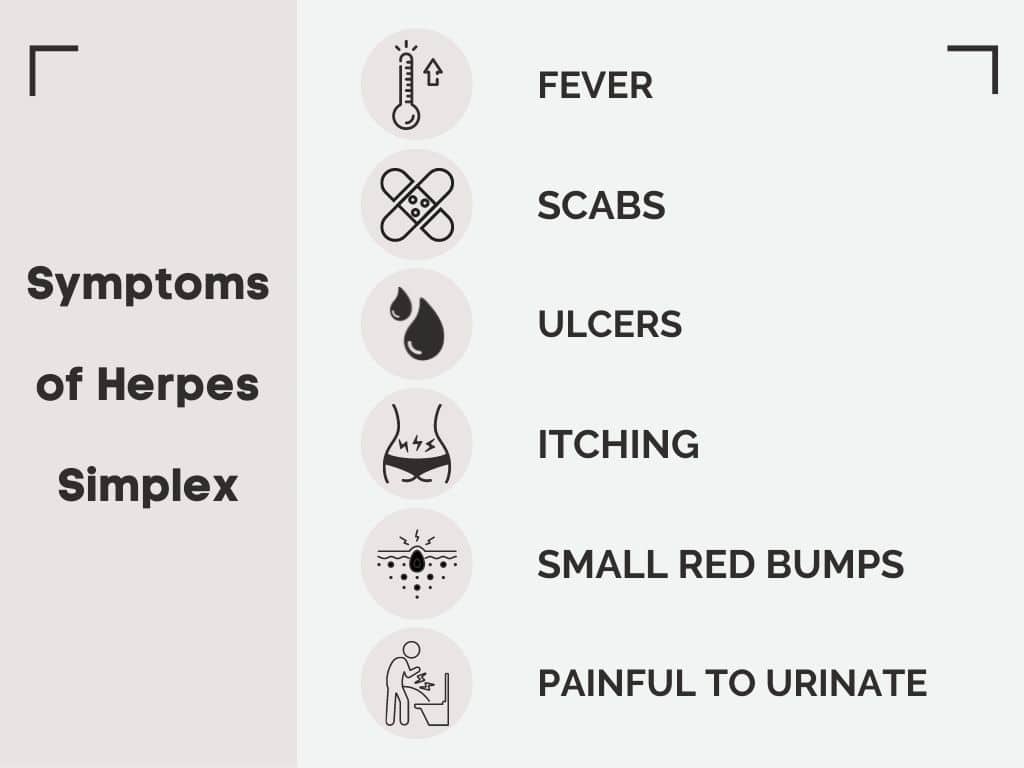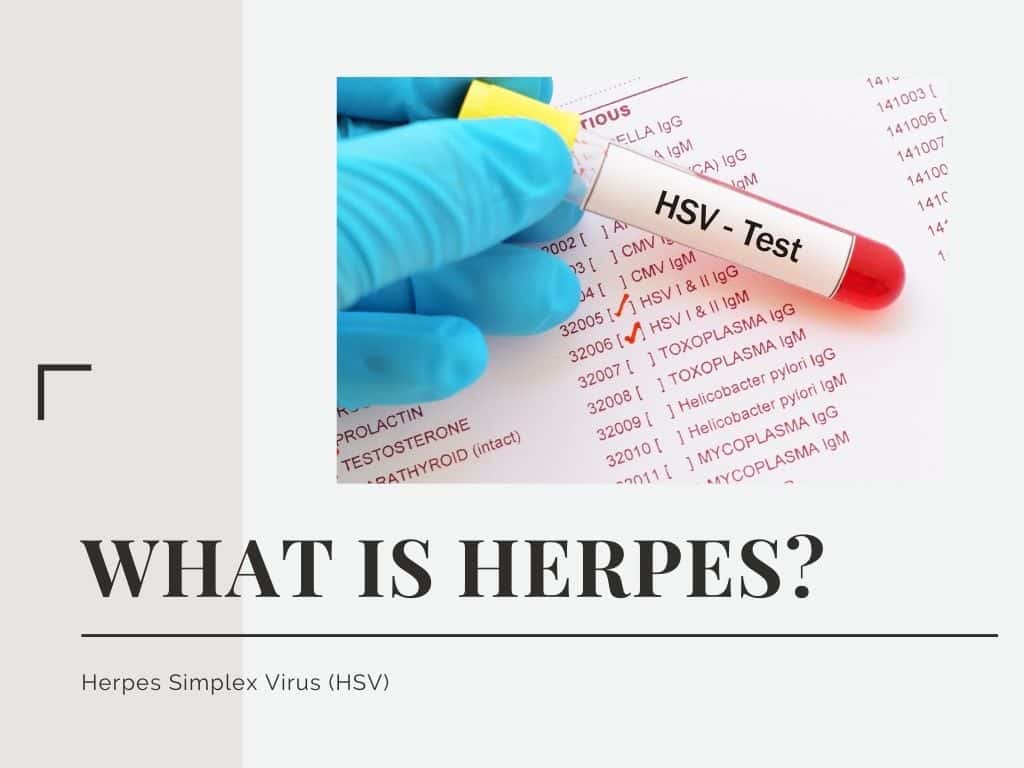Herpes is an infection caused by herpes simplex virus (HSV). Herpes can appear in various parts of the body. It is characterized by blister-like rash over the lips or genitals. The rash is extremely painful and may cause other complications.
There are two types of the herpes simplex virus:
- HSV-1 causes oral herpes, which usually affects the mouth and surrounding skin.
- HSV-2 causes genital herpes, which is usually sexually transmitted. Genital herpes is a common sexually transmitted disease (STD) that any sexually active person can get. Most people with the virus don’t have symptoms. Even without signs of the disease, herpes can spread to sexual partners.
Two types of the herpes

Recognizing the signs of herpes simplex
It’s important to understand that someone may not have visible sores or symptoms and still have an infection. They may also transmit the virus to others.
Some of the symptoms associated with this virus include:
- blistering sores (in the mouth or on the genitals)
- pain during urination (genital herpes)
- itching
- fever
What causes herpes simplex?
- Herpes simplex viruses enter through the skin and travel to the nerves, where they generally do not cause problems. Herpes can cause skin sores, however, when the viruses become active.
- Other locations in the body, such as the eyes or neck, can also be affected. Each of these two viruses can affect the areas that are typically associated with the other virus.
- There are also other herpes viruses, though they aren’t associated with these issues. For example, chickenpox is caused by herpes zoster. Infectious mononucleosis (a.k.a. mono) is caused by Epstein-Barr, which is also a herpes virus.
How do you get herpes?
- Herpes is easily spread from skin-to-skin contact with someone who has the virus. You can get it when your genitals and/or mouth touch their genitals and/or mouth — usually during oral, anal, and vaginal sex.
- Herpes can be passed even if the penis or tongue doesn’t go all the way in the vagina, anus, or mouth. You don’t have to cum to spread herpes. All it takes is some quick skin-to-skin touching. You can also get herpes from kissing someone who has oral herpes.
- The skin on your genitals, mouth, and eyes can be infected easily. Other areas of skin may get infected if there’s a way for the herpes virus to get in, like through a cut, burn, rash, or other sores. You don’t have to have sex to get herpes. Sometimes herpes can be passed in non-sexual ways, like if a parent with a cold sore gives you a peck on the lips. Most people with oral herpes got it when they were kids. A mother can pass genital herpes to a baby during vaginal childbirth, but that’s pretty rare.
- You can spread herpes to other parts of your body if you touch a herpes sore and then touch your mouth, genitals, or eyes without washing your hands first. You can also pass herpes to someone else this way.
- Herpes is most contagious when sores are open and wet, because fluid from herpes blisters easily spreads the virus. But herpes can also “shed” and get passed to others when there are no sores and your skin looks totally normal.
- Most people get herpes from someone who doesn’t have any sores. It may live in your body for years without causing any symptoms, so it’s really hard to know for sure when and how you got it. That’s why so many people have herpes — it’s a pretty sneaky infection.
- Because the virus dies quickly outside the body, you can’t get herpes from hugging, holding hands, coughing, sneezing, or sitting on toilet seats.
Symptoms of herpes simplex

- Most people infected with HSV don’t know they have it because they don’t have any signs or symptoms or because their signs and symptoms are so mild.When present, symptoms may begin about two to 12 days after exposure to the virus. If you experience symptoms of genital herpes, they may include:
- Pain or itching. You may experience pain and tenderness in your genital area until the infection clears.
- Small red bumps or tiny white blisters. These may appear a few days to a few weeks after infection.
- Ulcers. These may form when blisters rupture and ooze or bleed.
- Ulcers may make it painful to urinate.
- Scabs. Skin will crust over and form scabs as ulcers heal.
- During an initial outbreak, you may have flu-like signs and symptoms such as swollen lymph nodes in your groin, headache, muscle aches and fever.
Differences in symptom location
Sores appear where the infection entered your body. You can spread the infection by touching a sore and then rubbing or scratching another area of your body, including your eyes.

Men and women can develop sores on the:
- Buttocks and thighs
- Anus
- Mouth
- Urethra (the tube that allows urine to drain from the bladder to the outside)
Women can also develop sores in or on the:
- Vaginal area
- External genitals
- Cervix
Men can also develop sores in or on the:
- Penis
- Scrotum
Who is at risk of developing herpes simplex infections?
- Anyone can contract HSV, regardless of age. Your risk is based almost entirely on exposure to the infection. In cases of sexually transmitted HSV, people are more at risk when they have sex not protected by condoms or other barrier methods.Other risk factors for HSV-2 include:
- having multiple sex partners
- having sex at a younger age
- being female
- having another sexually transmitted infection (STI)
- having a weakened immune system
- if a pregnant woman is having an outbreak of genital herpes at the time of childbirth, it can expose the baby to both types of HSV, and may put them at risk for serious complications.
How is herpes simplex treated?
There is currently no cure for this virus. Treatment focuses on getting rid of sores and limiting outbreaks. It’s possible that your sores will go away without treatment. However, your doctor may determine you need one or more of the following medications:
- Acyclovir
- Famciclovir
- Valacyclovir
These medications can help people with an infection reduce the risk of transmitting the virus to others. The medications also help to lower the intensity and frequency of outbreaks.
These medications may come in oral (pill) form, or may be applied as a cream. For severe outbreaks, these medications may also be administered by injection.
What is the long-term outlook for herpes simplex?
People who contract HSV will have the virus for the rest of their lives. Even if it does not manifest symptoms, the virus will continue to live in nerve cells.
Some people may experience regular outbreaks. Others will only experience one outbreak after they contract the virus, and then the virus may become dormant. Even if a virus is dormant, certain stimuli can trigger an outbreak. These include:
- Stress
- Menstrual periods
- Fever or illness
- Sun exposure or sunburn
- It’s believed that outbreaks may become less intense over time because the body starts creating antibodies. If a generally healthy person contracts the virus, there are usually no complications.
Complications of herpes simplex
- Other sexually transmitted infections. Having genital sores increases your risk of transmitting or contracting other sexually transmitted infections, including AIDS.
- Newborn infection. Babies born to infected mothers can be exposed to the virus during the birthing process. This may result in brain damage, blindness or death for the newborn.
- Bladder problems. In some cases, the sores associated with genital herpes can cause inflammation around the tube that delivers urine from your bladder to the outside world (urethra). The swelling can close the urethra for several days, requiring the insertion of a catheter to drain your bladder.
- Meningitis. In rare instances, HSV infection leads to inflammation of the membranes and cerebrospinal fluid surrounding your brain and spinal cord.
- Rectal inflammation (proctitis). Genital herpes can lead to inflammation of the lining of the rectum, particularly in men who have sex with men.
Pregnancy precautions
If you’re pregnant and know you have genital herpes, tell your doctor.
If you think you might have genital herpes, ask to be tested for it.
Your doctor may recommend that you start taking herpes antiviral medications late in pregnancy to try to prevent an outbreak around the time of delivery. If you’re having an outbreak when you go into labor, your doctor will probably suggest a cesarean section to reduce the risk of passing the virus to your baby.
Preventing the spread of herpes simplex infections
- Although there is no cure for herpes, you can take measures to avoid contracting the virus, or to prevent transmitting HSV to another person.
- If you’re experiencing an outbreak of HSV-1, consider taking a few preventive steps:
- Try to avoid direct physical contact with other people.
- Don’t share any items that can pass the virus around, such as cups, towels, silverware, clothing, makeup, or lip balm.
- Don’t participate in oral sex, kissing, or any other type of sexual activity during an outbreak.
- Wash your hands thoroughly and apply medication with cotton swabs to reduce contact with sores.
- People with HSV-2 should avoid any type of sexual activity with other people during an outbreak. If the person is not experiencing symptoms but has been diagnosed with the virus, a condom should be used during intercourse. But even when using a condom, the virus can still be passed to a partner from uncovered skin.
- Women who are pregnant and have an infection may have to take medication to prevent the virus from infecting their unborn babies.
Things You Should Know About Herpes
- It is estimated that one out of six people have genital herpes. About 90% of them don’t have any symptoms.
- Herpes is a very manageable skin condition and does not cause any damage to the internal organs.
- Herpes (oral and genital) cannot be spread through inanimate objects such as spoons, glasses, razors, towels, bed sheets, etc. Herpes can only be passed through direct skin-to-skin contact with the infected area such as kissing, oral sex, genital-to-genital rubbing, vaginal sex, and anal sex.
- Herpes (oral and genital) can be spread even when there are no symptoms or sores. This is called asymptomatic shedding. Suppressive antiviral therapy significantly reduces asymptomatic shedding (and outbreaks). Valacyclovir taken daily can reduce risk of transmission to a partner by as much as 50%.
- Using a condom does not ensure a 100% protection from herpes infection to the partner.
References
Oral & Genital Herpes
https://docs.google.com/document/d/12iUNtUXn2NVYEjnCP0zkHgaGljk4ag16qzbEmYl4yqE/edit#
Herpes Simplex
https://www.healthline.com/health/herpes-simplex#treatment
Causes and Risk Factors of Herpes
https://www.verywellhealth.com/herpes-causes-risk-factors-1068800
Genital herpes
https://www.mayoclinic.org/diseases-conditions/genital-herpes/symptoms-causes/syc-20356161
5 Things You Should Know About Herpes
https://www.medicinenet.com/5_things_you_should_know_about_herpes/article.htm#what_is_herpes
Last Updated on 24/10/2024 by ทีมที่ปรึกษา มูลนิธิเพื่อรัก


